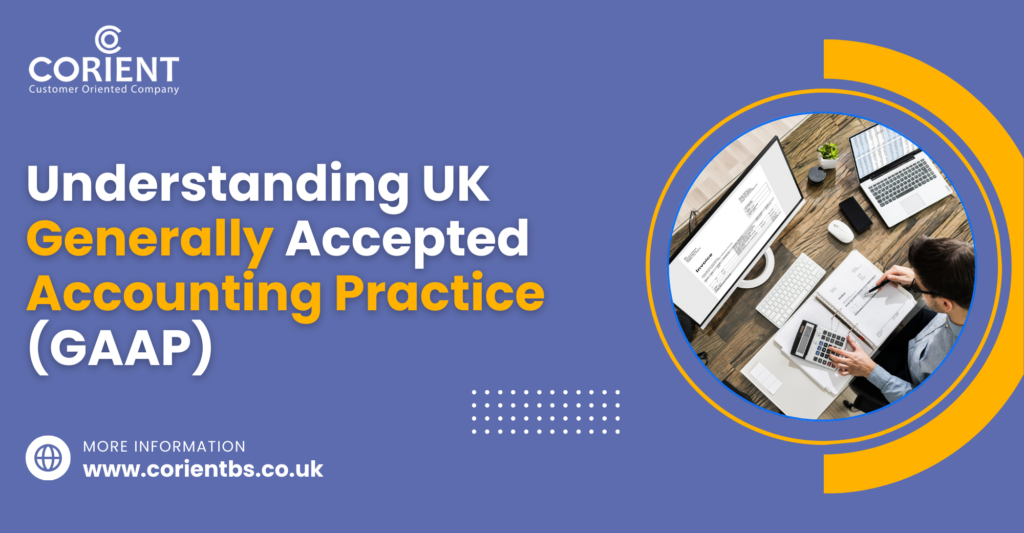
Understanding UK Generally Accepted Accounting Practice (GAAP)
Many of your clients may have a tendency to ignore the Generally Accepted Accounting Practice or UK GAAP, but it is very important for making their business attractive to investors. Hence, it is your client’s responsibility to implement policies and processes that align with these standards.
These standards maintained by financial reporting council ensure consistency and transparency, thus making sure that the information provided is reliable and helping investors make informed business decisions.
What is the UK GAAP?
The Financial Reporting Council publishes and updates the UK GAAP(General Accepted Accounting Principles), a set of accounting principles and guidelines that businesses in the UK are supposed to follow when preparing their financial reports and accounts.
Once businesses prepare reports or when accounting practices prepare balance sheets and profit and loss statements on their behalf in accordance with the standards of UK Generally Accepted Accounting Practice GAAP, they must submit them to HMRC and Companies House, as Companies Act 2006.
Thanks to UK GAAP it has helped accounting and financial teams because of its positive impact on the following activities:
- Measuring of economic activity
- Putting together economic information and summarising it
- Monitoring measurements on a regular basis
- Disclosing information about an activity
UK GAAP vs. IFRS
When it comes to UK GAAP vs. IFRS, we would like to mention that both are important, and their application will depend on various factors. Firstly, you need to know that UK GAAP stands for General Accepted Accounting Principles and its regulations are not applicable to all UK companies. Only listed companies follow UK GAAP to ensure full compliance; on the other hand, non-listed companies use International Financial Reporting Standards (IFRS).
IFRS is globally recognised and accepted by multiple countries and was developed by the International Accounting Standards Board (IASB). If UK General Accepted Accounting Principles is applicable to UK-based and listed companies, then IFRS is ideal for businesses involved in international business and high-volume international transactions.
What Does UK GAAP Do?
Thanks to UK Generally Accepted Accounting Practice GAAP, accounting practices and businesses like public traded companies prepare financial statements in a standardised version, making them easy to understand and ready for use by investors, shareholders, and regulators.
By following the UK GAAP, you are providing your client’s investors and creditors with useful information that shows their business health in a transparent and easy-to-understand way.
UK GAAP contains certain financial reporting standards (FRS) protocols which are:
- FRS 100 – The Application of Financial Reporting Requirements
- FRS 101 – The Reduced Disclosure Framework
- FRS 102 – The Financial Reporting Standard Applicable in the UK and ROI
- FRS 103 – Insurance Contracts
- FRS 104 – Interim Financial Reporting
- FRS 105 – The Financial Reporting Standard Applicable to Micro-Entities
By following the above-listed standards, the reporting of financial information will remain consistent, allowing stakeholders of your client’s business and regulatory authorities to access detailed financial information promptly.
Apart from promoting transparency among the stakeholders, the financial information in the annual financial statements will help your clients make informed business decisions. In short, we can safely say the financial statements prepared in accordance with UK General Accepted Accounting Principles will help your client’s business like public traded companies or individual businesses be compliant and profitable.
How to Comply with UK GAAP?
Each business has its own financial requirements, and based on those, multiple businesses adopt the best accounting practices relevant to their businesses. However, by being UK GAAP compliant, you can help your client maintain financial records in such a standard way that it will be easy for relevant stakeholders to gather accurate information about the business’s financial performance.
To make the financial records UK GAAP compliant, you will need to do the following things:
- Need to find out which reporting standards apply to your client’s business.
- After that, you must analyse the reporting standard’s impact on your client’s business.
- Need to ensure your client’s records and data are up to date, plus their internal accounting systems and policies must be checked.
- Last but not least, stay informed about the deadlines so the reports can be submitted accordingly.
Now, you can use accounting software to create UK GAAP compliant financial statements and track other non-GAAP parameters. Compared to IFRS, following UK GAAP is less complicated, but it will consume a lot of time and can potentially divert essential resources away from other important accounting tasks. Therefore, it is important to avail yourself of the outsourcing services of an accountant offered by professional service providers such as Corient.
Our professional accountants master the latest standards, including UK GAAP, and use various accounting software with high skill. The software helps our accountants generate UK GAAP complaint reports in less time, thus quickening the process.
Conclusion
To conclude, this blog has covered most of the things related to UK GAAP. However, it is important to note that the standards of UK GAAP and its reporting requirements keep changing. Hence, it is important to keep an eye on the latest updates to avoid non-compliance.
Fairly speaking, handling this can be overwhelming, especially when you focus on other important accounting tasks. You can get help from the latest accounting software, but your accountants will require training and experience to handle it efficiently. A professional accounting outsourcing service provider like Corient can be highly beneficial in such a situation. Our accounting services and reports always comply with the latest accounting standards, including UK GAAP. For more information about our services or to share your requirements in detail, please contact us via our website.


